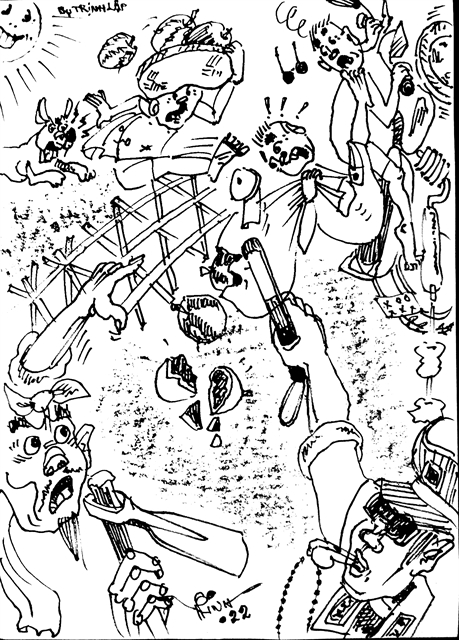 Talk Around Town
Talk Around Town

 |
Illustration by Trịnh Lập
by Nguyễn Mỹ Hà
It was a quite small yet shocking piece of news. A weather-beaten farmer in his 60s was recently filmed in tears, tossing and turning on the ground of his watermelon farm amid a vast sea of watermelons that had been crushed and destroyed by a group of youths in a pathetic act of retaliation.
Earlier in the day, the farmer had told off the youngsters for attempting to steal a melon from a neighbour's farm. Not only did the elderly man's word not prevent the youths from stealing the watermelon, but they incited the gang to come back later in the afternoon and exact petty revenge.
For a family like that of the man, the 500 square metres of land under watermelon is their fortune. Yet, half of the fruit was ruined in one afternoon.
What was devastating was that these youths had become so angry that they did not recognise they were doing wrong, but simply intended to destroy another person's property out of pure malice.
The youths, children of farmers, knew where and how to hit that elderly man the worst.
"I could not hold back my tears watching this elderly man, about my parents' age, agonising over the loss of his harvest," commented a reader under the devastating images and video of the man rolling on his field.
An estimated watermelon harvest of about 250kg of fruit is half of this family's three months of hard work.
When everyone felt sympathy for the elderly man, yours truly included, another part of me also wondered how these youngsters did not care about right and wrong. All five of them should have known better.
The losses have been made up for by many well-wishers who offered some donation to the elderly man's family, and he is reported to have withdrawn his formal complaint.
According to attorneys, the law must still be enforced where it is broken. According to the Civil Code of 2015, any action determined to destroy anothers' property to the point of being impossible to use or retrieve shall see fines issued of between VNĐ10 million and 50 million, or even imprisonment of up to three years.
"Arrest them, bring them to court, punish them hard to teach them a lesson ..." were the overwhelming sentiments of the public on social media.
Of course, what is right and wrong in this case is crystal clear: stealing fruit from others is wrong. Taking vengeance by destroying someone else's property is even worse.
Should these youths be punished for what they've done? That they need to learn a lesson is surely not in any doubt.
On one side, the victim needs to be helped. On the other, the youths need help also. Among many opinions on the lost crop, some demanded the young men be fined with the highest punishment.
If these youths could be more considerate in their manners, they could have been spared from getting in trouble with the legal system, which is meant to bring justice to victims.
In this burning heat of the summer, if they had asked nicely, the elderly man and rightful owner of the farm may even have given them a watermelon to quench their thirst.
If they had any sense of propriety, they would not retaliate in such a barbaric manner. It looked awful.
Among much talk of punishment for the brutal actions, no one suggested that these young men could be each given a watermelon, and then punished by accompanying the man every day to take care of the rest of the crop until everything was harvested and sold.
An unwanted involvement with the law could stain the future of these youths when what they need is to learn a lesson and be able to release their anger in a way that is not so damaging to them.
This is easier said than done.
Educationalists shall say, their parents have given up on them, the school has given up on them and during a moment of thirst they acted without thinking.
Over the past days, we've seen so much kindness shared, and tears shed for the farmer. We now only wish some civil action could be taken that is educational and shows some kindness towards these wayward young men.
I, for one, hope that they can be given a chance to think more deeply about their faults and be allowed to pay back to the farmer and society. And I do not just mean give money back either, but to help out in the farm work, take care of the family, or even grow a new field of watermelon for the next crop as an act of community service.
This is more time-consuming and harder than just going home and getting some money to pay for the losses. But the issue here's not just the money from the lost crop but a larger loss of human feeling that these men could not see.
A bigger loss ahead could turn their future in an unwanted direction. We ought to look for a compassionate and practical response that benefits the whole of society. VNS




